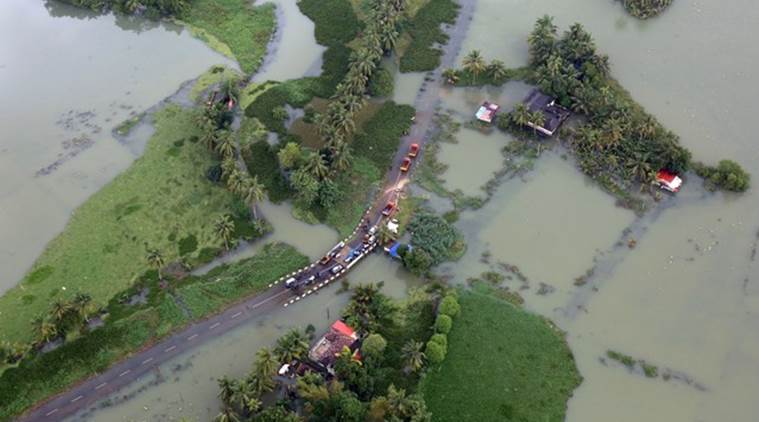 An aerial view shows partially submerged road at a flooded area in Kerala. (Source: Reuters/File)
An aerial view shows partially submerged road at a flooded area in Kerala. (Source: Reuters/File)
Amidst reports of the worst floods in a century in Kerala, controversies have arisen with regard to the acceptance of relief from foreign countries like the United Arab Emirates. A Ministry of External Affairs’ statement talked about the country’s resolve to use its own resources to meet the requirements of relief and resettlement of the victims rather than accept aid from a foreign country. Akhbar-e-Mashriq, in its editorial on August 24, notes: “The governments of Qatar, Maldives and Thailand have said that they will help Kerala deal with the crisis. The government of United Arab Emirates has been exceptionally generous by offering an aid of Rs 700 core. The offer is especially significant given that the Government of India has offered an aid of only Rs 600 crore to the flood hit state… In this hour of crisis, the country should not show false pride and accept aid from wherever it comes.”
The newspaper has also pointed to the statement of Kerala Chief Minister Pinarayi Vijayan, “The Disaster Management Plan prepared by the Centre in 2016 has a provision about accepting voluntary help from other countries.” It has also quoted the Kerala finance minister’s statement that if the Centre does not want to accept aid from a foreign country, it should give the state Rs 700 crore from its own coffers.
Munsif’s editorial of August 24 notes, “Unfortunately, there are some people in the country who are using this terrible disaster as a ruse to discriminate between different sections of the society.” The paper has talked of people who are describing the disaster in Kerala as a curse on them for eating beef. Others have said that the people of the state have been cursed “because women have been allowed entry into the Sabarimala temple. Such statements deserve severe condemnation,” the paper said.
Remembering Vajpayee
Rich tributes were paid to former Prime Minister, Atal Bihari Vajpayee. Describing his death as “end of an era,” Siasat, in its editorial on August 17, writes: “Even though Vajpayee had been part of the Jana Sangh and RSS, and later laid the foundation of BJP, he was much respected in Indian politics, even by those who differed with his views…He had the distinction of being asked by the then Prime Minister P M Narasimha Rao to represent India at an international conference on the issue of Kashmir, despite being in the Opposition… . During his tenure as prime minister he tried to solve the Kashmir issue. He gave the slogan of ‘insaniyat, jumhuriyat and Kashmiriat. But Vaypayee could not succeed in his efforts. He extended the hand of friendship with Pakistan and travelled to Lahore in a bus. But some forces foiled his attempt at the summit meeting in Agra that followed.”
Munsif, in its editorial on August 18, writes, “Vajpayee was probably the only politician of the present era whom no one hated. It was because of his moderate personality that the National Democratic Alliance could be formed… . After the anti-Muslim riots of 2002 in Gujarat, he had advised the state’s Chief Minister Narendra Modi to follow Raj Dharma.”
Sahafat, in its editorial on August 20, writes: “Five personalities — Mahatma Gandhi, BR Ambedkar, Sardar Patel, Syama Prasad Mookherjee and Deen Dayal Upadhyaya — have repeatedly come in for praise by Prime Minister Narendra Modi. The name of Atal Bihari Vajpayee has never figured in the list of those who were praised by him — except perhaps for a a few stray mentions. Among the various welfare programmes, only one — Atal Pension Scheme — has been named after him… .Modi often says that no significant work has been done in the last 70 years. These, obviously, include the six years when Vajpayee was the prime minister. No compliments have been paid by Modi for the work in that period of time.”
1984 debate
Commenting on Congress President Rahul Gandhi’s statement in London about the non-involvement of Congress in the anti-Sikh riots of 1984, Akhbar-e-Mashriq’s editorial of August 27 notes: “The Congress having had no hand in the massacre of Sikhs is an extremely bewildering revelation…In 2005, the then PM Manmohan Singh apologised to the Sikh community for the killings in Parliament. Sonia Gandhi too has, on many occasions apologised, to the Sikh community for that horrendous episode… .The Nanavati Commission that inquired into the anti-Sikh riots held Jagdish Tytler, Sajjan Kumar, Kamal Nath and HKL Bhagat responsible for the killings… .”
Hamara Samaj, in an editorial on the same day, writes: “Former Union Home Minister P Chidambaram has given a clean chit to Rahul Gandhi and said that Rahul Gandhi was only 13-14 years old in 1984 and those riots cannot in any way be linked with him…Rahul Gandhi was indeed very young at that time, but his statement that the Congress had no role in the killings cannot be digested. No one can forget that the then PM Rajiv Gandhi had said after the killing of Indira Gandhi by her Sikh guards, that “when a big tree falls, the earth shakes”. This could be seen as a trigger for what followed. It is true that Rahul Gandhi was very young at that time. But to say that the Congress was not responsible for the killings is a white lie.”